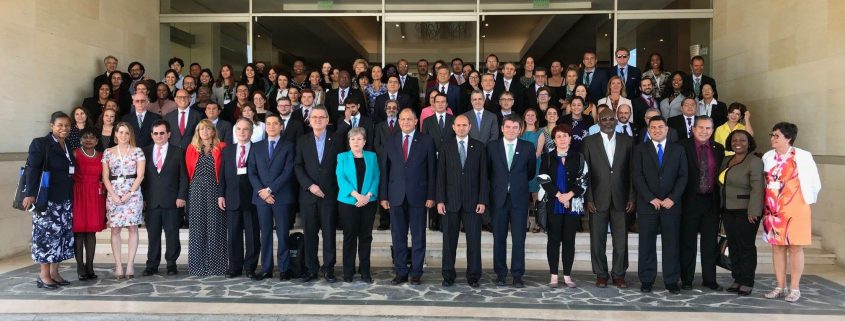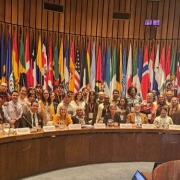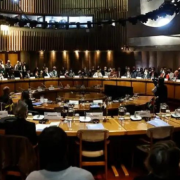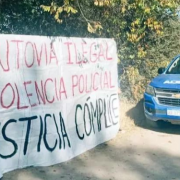The Regional Agreement on Principle 10 is binding
On March 4, representatives of 24 countries of Latin America and the Caribbean meeting in San Jose, Costa Rica, adopted the first binding regional agreement to protect the rights of access to information, public participation and access to justice in environmental issues The agreement adopted the character of binding, becoming an unprecedented legal instrument for the region. It was approved without reservation of the States and will require 11 ratifications for its entry into force.
“Below, we offer a google translate version of the original article in Spanish. This translation may not be accurate but serves as a general presentation of the article. For more accurate information, please switch to the Spanish version of the website. In addition, feel free to directly contact in English the person mentioned at the bottom of this article with regards to this topic”.
At the end of the Ninth Meeting of the Negotiating Committee of the Regional Agreement on Principle 10, government delegates, together with representatives of the public and experts from international organizations, agreed on the final text of the agreement. This text was negotiated since 2014, and it also enshrined the protection of human rights defenders in environmental matters.
A little history…
In June 2012, in the framework of the United Nations Conference on Sustainable Development, Rio + 20, ten countries signed the Declaration on the application of Principle 10 of the Rio Declaration on Environment and Development in Latin America and the Caribbean (the Declaration). This, recognized that the rights of access to information, participation and justice in environmental matters are essential for the promotion of sustainable development, democracy and a healthy environment. In addition, the Declaration committed signatories to explore the viability of a regional instrument to ensure the full implementation of access rights.
After two years of work, in November 2014 the signatory countries decided to start negotiating a Regional Agreement. A Negotiation Committee was created, which was formed by the signatory countries.
What is principle 10?
Principle 10 of the Rio Declaration seeks to ensure that everyone has access to information, participates in decision-making and accesses justice in environmental matters. This, in order to guarantee the right to a healthy and sustainable environment for present and future generations. The Declaration of Principle 10 is a major step forward in the region for stronger environmental governance.
Negotiations for the Agreement
The purpose of the negotiations for the Agreement was to deepen Latin American democracies, social cohesion, generate confidence in the decisions adopted, eliminate asymmetries and prevent socio-environmental conflicts. The aspiration of this treaty was to achieve a redefinition in the traditional relations of the State, the market and societies. It also sought to contribute to the implementation of the 2030 Agenda for Sustainable Development.
In 2015, with the first meeting of the Negotiating Committee for the Agreement, and after eight subsequent meetings; the representatives of the nations of Latin America managed to conclude the definitive text of the treaty that will adopt a binding character. The process of hard government work and civil society organizations, resulted in an instrument that improves the standards of access to information, participation and access to justice in environmental matters. The fact that it is binding speaks of a new level of commitment assumed by the governments of the region and guarantees the protection of environmental defenders.
Along the way to reach the Regional Agreement, civil society played a very important role in terms of recommendations for the final text. It was before the eighth meeting (held at the end of 2017), when the civil society organizations expressed their concern about the progress of the negotiations and demanded from the governments a greater commitment to effectively guarantee the rights under discussion. The security situation for environmental defenders became a turning point to demand that the agreement be transformed into a legally binding instrument capable of reversing this situation.
The ninth and last meeting…
As mentioned, the Ninth Meeting for the Negotiation of the Regional Agreement was the last and resulted in the adoption of a final text and in the realization of a binding instrument. In that sense, it became a tool at the regional level that will serve for the protection of environmental defenders and their rights. This is extremely important since one of the main causes of socio-environmental conflicts in Latin America and the Caribbean is the lack of environmental information. Likewise, one of the main consequences of these conflicts is violence, persecution and assassination of environmental defenders. This Agreement then comes to fulfill the first mandate of the negotiations: “Prevent socio-environmental conflicts”.
Other important elements to be included in the Agreement were highlighted before this meeting. One of them was to strengthen the definitions that were still pending such as rights of access, authority and fundamentally that of environmental defenders. Another necessary issue was to define what includes access to environmental information (included in article 2, Inc. c). It is important that the instrument include a broad definition with a list of elements that constitute this type of information (enshrined in Article 6 of the final text). Similarly, with the definition of people and / or groups in vulnerable situations (enshrined in Article 2, Inc. e of the final text). Finally, another relevant point was to include the participation of the public in the structure of what the implementation of the Agreement will be like the Conference of the Parties and the Facilitation and Follow-up Committee. This last element was reflected in article 15, urging the Conference of Parties to define the modalities of public participation (however, public participation is not included as the structure of the Conference). The text of the treaty states that the Agreement will be open for signature by all the countries of Latin America and the Caribbean at the United Nations Headquarters in New York from September 27, 2018 to September 26, 2020. Likewise, It will be subject to ratification, acceptance or approval by the States that have signed it. The ratification of 11 nations will be needed for its entry into force.
The result of the negotiations will allow countries to commit themselves to implement this agreement in their respective territories in a concrete manner. With an agreement without the binding nature that obliges States to implement this Agreement, the rights of access to information, participation and justice would not be assured with certainty.
We celebrate the evolution of this process, highlighting the importance of this agreement to achieve better and more solid democracies. Likewise, we consider that a large part of the environmental problems of the region (related to extractive industries and large infrastructure projects) may find a solution after the implementation of this Regional Agreement.
Más información
- Ninth Meeting for the Regional Agreement
- Final text of the treaty
- FUNDEPSparticipates in the first meeting of the Negotiating Committee of the Regional Agreement on Principle 10
- The 3rd Meeting of the Negotiating Committee of the Regional Agreement on Principle 10 was held
- We support the declaration of Principle 10 and the objectives of sustainable development
- Towards a regional agreement on environmental human rights
- ECLAC Report: Access to information, participation and justice in environmental matters in Latin America and the Caribbean
Authors
Agustina Palencia
Contact
María Pérez Alsina – mariaperezalsina@fundeps.org
Agustina Palencia – agustinapalencia@fundeps.org








